Montana is the kind of state where people go to find second chances and start a new life, and where people care more about what you will do than what you’ve done.
Livingston, Montana, is the kind of town where trains still rumble through the historic downtown and diners enjoying a meal al fresco don’t even look up as the ice dances in their glasses. It’s the kind of place that has an outline of a giant fish on the hillside, so even if you don’t know it’s the trout capital of the world, you kind of get the idea.
It’s also the place that business administration major and art history minor Diana Abbott ’18 has called home for the last two summers as she gets her feet wet in the world of fly fishing.
From Chasing Snow to Chasing Fish
Six years ago, Abbott, from Truckee, Calif., was already a seasoned competitive ski racer accustomed to chasing snow year round — from the age of 10, she’d spent summers training in New Zealand, Switzerland, Austria and on Mount Hood in Oregon. She had her sights set on the U.S. Ski Team until a training accident on a foggy New Zealand course sent her down a different trail. After a year of seeing doctors for her back injury, she started thinking about what life might look like without a professional skiing career. College and law school, which hadn’t been in the cards, became possibilities. While she healed, she picked up a fly rod, fell in love with the sport and redirected her focus from carving to casting.
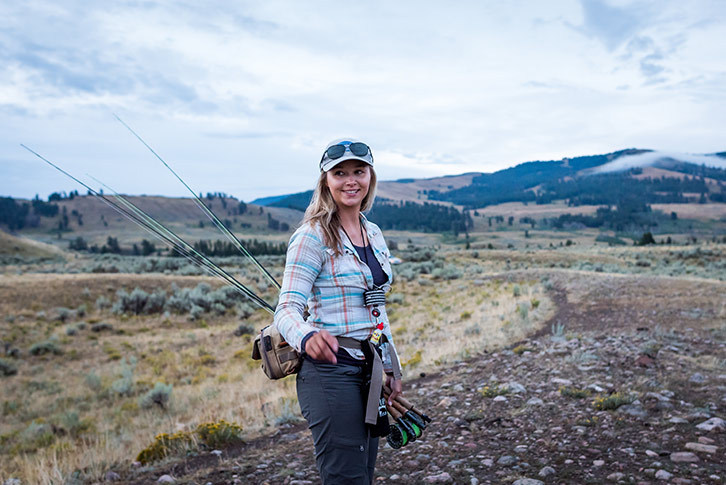
“What I love about fly fishing is that it keeps you learning and it keeps you in the moment. It’s like skiing in that way; you always have to look ahead and stay in the moment. Watching that fly on the water, you don’t really see what’s going on around you, and I guess that’s what attracted me,” Abbott said. “At home, we have these beautiful, big yellow mayflies that hatch on the lake; fish will come up and grab them, but they’ll pattern. So then you’re watching the fish move and you know where to cast and then they’ll come up and grab that. I thought there was kind of an art to it all and no one could stop me. I just took that passion and kept going.”
Fly fishing is a male-dominated sport, but Abbott recognized there was space and opportunity for women to be successful, especially with powerful marketing.
“I have no clue why the gender imbalance is so significant because anyone can fish, but as a business major, an untapped market is the kind of niche you gravitate to,” Abbott said. “So the question becomes, how can you distinguish yourself in an industry that may not be touched by a lot of women yet? You don’t see a lot of female guides. That really attracted me.”
In 2016, Abbott researched the most successful fly fishing travel companies and found Sweetwater Travel Company, based in Livingston but with operations in Alaska, Brazil, Mongolia and beyond. With the confidence of a ski racer, she cold called owner Dan Vermillion, told him she wanted to learn his business and asked two things: Could she do an internship with him, and could she complete his guide school to improve her skills? He said yes to both.
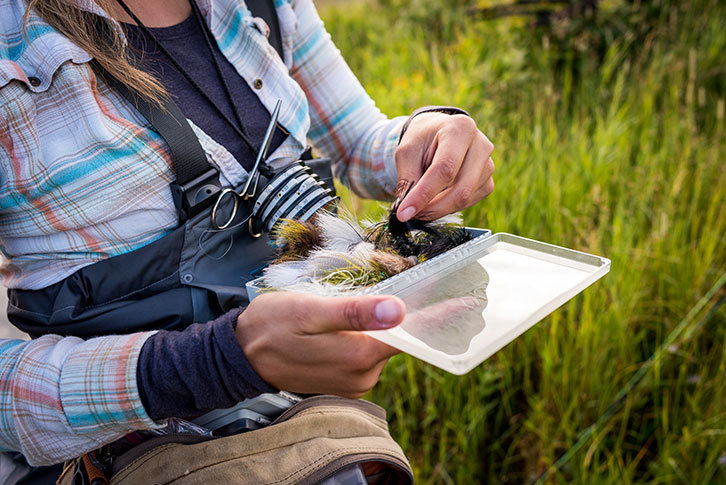
“I walked into Sweetwater
Abbott sailed through the fly tying and first aid components of the weeklong course, then learned to drive a jet boat and row a drift boat.
“Rowing is a big part of it all. It’s tough work. You have to be able to row in challenging situations and be confident in yourself that you can get through a section of the river," Abbott said. "We go down the Yellowstone River all the time and early in the season, the
Never Stop Learning
In 2017, Abbott returned to Sweetwater for the summer as a full-time seasonal employee and to complete Colby-Sawyer’s internship requirement. If her first stint was an introduction to the company, her second was an immersive experience. Most interns have an office to figure out – she had that, plus all of southwestern Montana and Yellowstone National Park. The way to get to know it all?
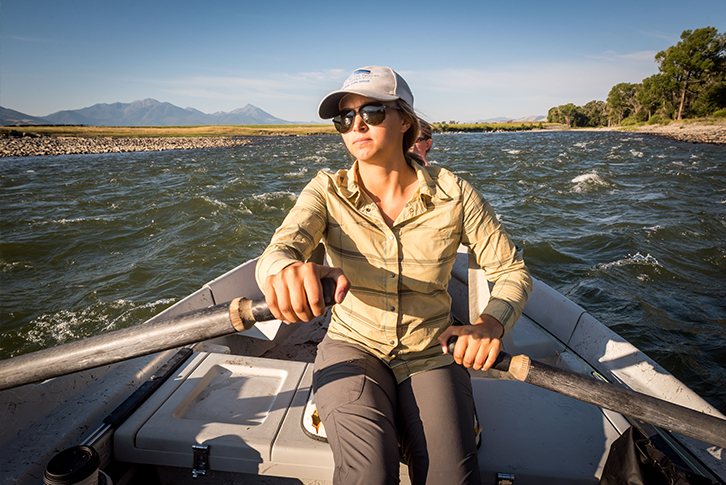
“You just go for it,” Abbott said. “You can’t be afraid. You just immerse yourself in fly fishing, people see that you love it, and you get accepted and then you get more confidence.”
In the office, Abbott booked trips, hosted clients, strategized online marketing, used the QuickBooks knowledge she learned at Colby-Sawyer and helped wherever needed. Her dedication earned her a spot in the Sweetwater family, invites to barbecues and more info about the rivers around her. It wasn’t long before the dashboard of her Pathfinder was stuffed with maps and books on fishing, local waterways and conservation.
“The fly fishing business is about a lot more than being a guide, and every aspect of my major came into play. I’ve been taught well,” Abbott said “We do a lot of group projects in the Business Administration Department, which is great; I like figuring out how each individual works. The biggest required skill for my internship was being able to talk to people and understand what they needed and wanted. It’s about marketing, accounting and finance. But there’s the balance of making money and giving people the experience of a lifetime, too.”
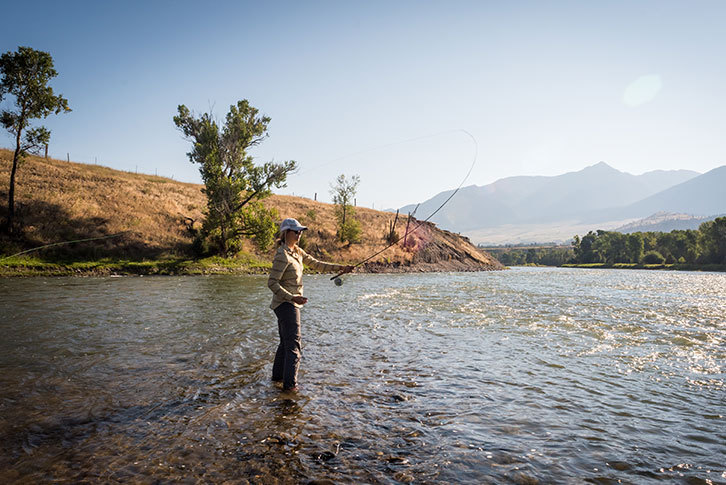
As a guide, Abbott was responsible for every detail of the guests’ experience, from packing lunches and arranging shuttles to knowing the water and keeping people safe as they waded in dangerous rivers. And, of course, she had to teach others how to fly fish.
“I enjoyed all of it. The hardest part was sometimes you’re not catching fish, but you want to make sure everyone’s having a good time anyway,” Abbott said. “My philosophy with fly fishing is don’t give up. Keep switching it up. It may take time to switch rigs, but it’s so worth it because that next cast, you could have a fish.”
As Abbott is quick to remind, it’s called fishing, not catching, but there’s no doubt a trout on her line is a thrill every time.
“The fish catching part of it, for me, that’s when you know you’re doing it right. When the presentation is perfect, you’ve found the perfect spot and you catch that fish, it’s the best,” Abbott said. “But it’s not the whole sport. It’s getting to that perfect spot. It’s setting up your lines. It’s seeing those beautiful cutthroats up close; they’re just amazing.”
Worlds Collide
While Abbott certainly hopes to connect with a fish on her line, it’s connecting with nature in general that really drives her, whether on the snow or on the river. She spent her days off fishing in Yellowstone, a park saturated in diverse beauty but assaulted by acts of humankind ranging from ridiculous interactions with wildlife to mining proposals. The area resonates with Abbott so much that she has switched her residency to Montana and plans to return after graduating.
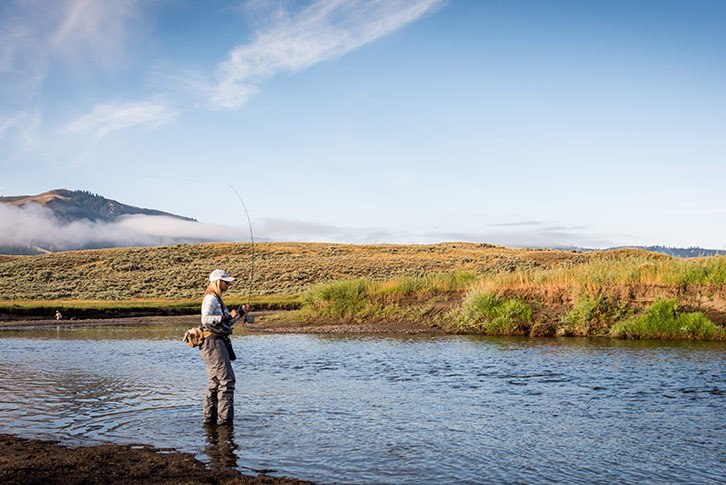
Conservation is becoming a bigger and bigger part of Abbott’s life, not only because of the issues her adopted state faces, but because of a course she took at Colby-Sawyer: River Communities, with its field study component in the Colorado River Basin.
“I thought as a fly fisherman, learning more about river systems and the challenges that face them would give me a better understanding of what’s around me, and that’s so important,” Abbott said.
When the class met with water lawyers out West, Abbott’s early thoughts about law school came into sharp focus. It was at this confluence of Colby-Sawyer course work and her passion for being on the water that yet a new path opened up for Abbott.
“I think there’s a reason I got into fly fishing, and that’s to go to law school and make a difference,” Abbott said. “Meeting all the river’s stakeholders changed how I felt about everything — water law is what I’m going to pursue.”
Abbott will spend the summer after graduating from Colby-Sawyer guiding on the rivers of Montana before heading off to law school. She’ll chase those fish into a new life, the one made possible by an accident and the realizations that skiing wasn’t everything and that she could be successful in other ways. And after all that, there’s really only one important question for the lawyer-to-be: What will she do next?